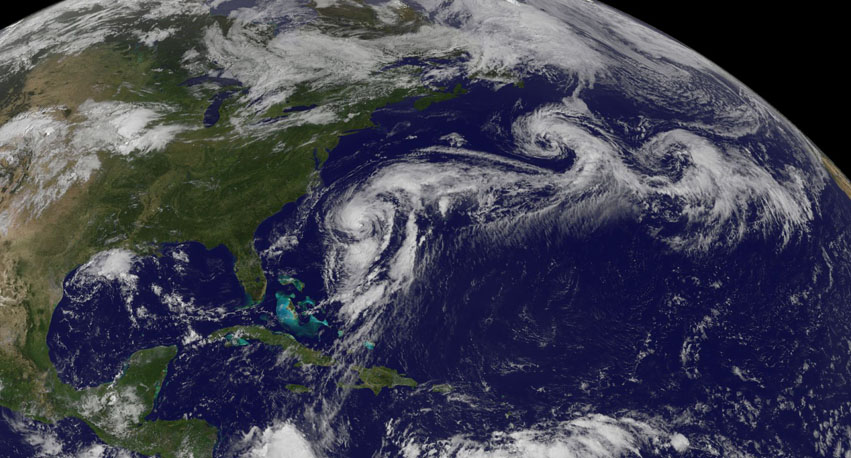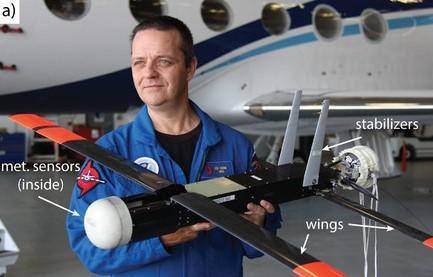An American Meteorological Society Media Resource

Image of Hurricane Cristobal in the Atlantic, taken by GOES East satellite on August 27, 2014. Photo credit: NOAA.
Hurricanes are extremely dangerous storms that damage communities every year, and climate change has the potential to amplify hurricane hazards. Scientists have made great progress in understanding and forecasting both hurricanes and their effects. Further advances in hurricane science and response can help save lives, livelihoods, and resources.
Hurricanes: The Basics
A hurricane is an intense form of tropical cyclone (a large, rotating storm system that forms over the tropical or subtropical ocean). A tropical cyclone is called a hurricane if it has maximum sustained wind speeds of at least 32 meters per second (roughly 64 knots/74 miles per hour) AND it occurs in the Western Hemisphere (the North Atlantic, Caribbean, Gulf of Mexico, or the eastern and central North Pacific). A weaker storm system in the same region is a tropical storm or a tropical depression. Storms of hurricane strength in other regions go by different names (for example, the term “typhoon” is used in much of the Pacific).
View the technical definition of a hurricane: AMS Glossary of Meteorology.
Hurricane categories: Hurricanes are ranked based on wind speed, Category 1-5 (least to most severe) using the Saffir-Simpson Hurricane Wind Scale. Category 3 or higher is considered a “major” hurricane.
Hurricane names: Individual hurricanes are named by the World Meteorological Organization. See the list of names: Tropical Cyclone Naming.
Hurricane updates: In the United States, the National Hurricane Center predicts, tracks, and informs the public about active and potential hurricanes and tropical storms. See current tropical cyclone activity on their website: National Hurricane Center.
AMS Hurricane Experts
Below are some AMS members who are experts on hurricanes. To reach these and other experts, please contact [email protected].

Kerry Emanuel
Emeritus Professor
MIT
Hurricanes and
Climate Change

Sharan Majumdar
Professor, Department of
Atmospheric Sciences
University of Miami
Hurricane Predictability

Suzana Camargo
Marie Tharp Lamont
Research Professor
Columbia University
Tropical Cyclones and
Climate
Hurricane Hazards
The AMS statement on tropical cyclones pinpoints five primary hazards behind tropical cyclone fatalities and destructiveness:
- Storm surge (in which storms raise the local sea level and drive seawater onshore)
- Heavy rains and associated freshwater flooding
- Strong winds
- Tornadoes
- Rip currents
In the past decade, freshwater flooding has been the primary cause of hurricane fatalities. Yet “indirect” causes—such as carbon monoxide poisoning from poorly ventilated generators and lack of medical access post-storm—have killed nearly as many people as weather and water. Read more about recent trends in this August 2023 blog post by National Hurricane Center staff: Recent Trends in Tropical Cyclone Fatalities in the United States
Hurricanes and Climate Change
Climate change:
- Has the potential to increase cyclones’ destructive power (e.g., intensity, amount of rainfall, and storm surge inundation).
- Is already altering, and can be expected to further disturb, physical characteristics of the Earth such as storm tracks and coastline locations.
- Is causing widespread ecological stress that may be exacerbated by severe storms, putting important ecosystem services at risk. In addition, it is harming biological systems (such as coral reefs and mangroves) that would normally provide some coastal protection during hurricanes.
- Can act to weaken human-created systems and infrastructure (for example, existing seawalls and levies are increasingly inadequate to protect populated regions as sea levels continue to rise).
- Increases the vulnerability of crucial systems (such as water resources, health systems, transportation infrastructure, and agriculture) to extreme and routine weather events.
These effects could make hurricanes even more dangerous. For more information, read the IPCC’s 6th Assessment Report, Chapter 11 on Weather and Climate Extreme Events.
Forecasting and Response
Hurricane forecasting improvements are saving lives, livelihoods, and property. They make it possible for planners to focus their risk-reduction efforts and avoid dangerous or inappropriate responses such as unnecessary evacuations. In 2018, according to the AMS Statement on Tropical Cyclone Forecasting in the United States, predictions of a tropical cyclone’s path five days in advance were about as accurate as two-day forecasts were in 1995.
Improved forecasts over the last several decades draw from widespread scientific advances in areas like Earth system observations (including satellite, airborne, ground, and ocean-based platforms), modeling, and data assimilation and processing.

J. Cione holding a Coyote drone used in hurricane reconnaissance at NOAA’s Aircraft Operations Center (key features annotated). From “Eye of the Storm: Observing Hurricanes with a Small Unmanned Aircraft System,” Bulletin of the American Meteorological Society, Vol. 101(2).
We can get even better. Investments in hurricane science and observations will provide dramatic benefits to humanity as we prepare for future tropical cyclones. Partnerships across government, emergency management, academia, private enterprise, and NGOs can help leverage and apply hurricane science and increase public engagement to help communities stay safer.
Read the AMS Statement on Tropical Cyclone Forecasting in the United States.
AMS and Hurricanes
AMS is the professional society for weather, water, and climate science and services. AMS members include (among others) researchers studying all aspects of hurricanes and other extreme weather; broadcast meteorologists; weather forecasters; local and regional emergency managers; climate scientists; and professionals working within relevant federal agencies including the National Weather Service, the National Hurricane Center, and the Federal Emergency Management Agency. The AMS Committee on Tropical Meteorology and Tropical Cyclones periodically hosts the international Conference on Hurricanes and Tropical Meteorology.
Other Resources
More about tropical cyclones (including hurricanes) from Climate Central: Extreme Weather Toolkit: Tropical Cyclones